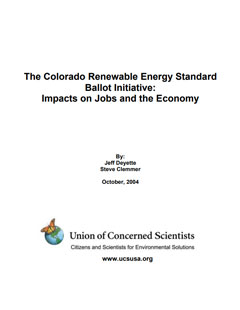A growing number of states have enacted policies to increase the use of renewable electricity sources. Seventeen states have enacted renewable energy standards that require electric companies to increase their use of renewable energy sources. Fifteen states have enacted renewable energy funds, which provide financial resources for renewable energy development.
Colorado's Amendment 37 will be the first opportunity for citizens in any state to vote on these policies directly. Amendment 37 would establish a renewable energy standard requiring the state's largest electric companies to increase their use of renewable sources from less than two percent today to 10 percent of electricity sales by 2015. The Amendment would also establish a funding mechanism for solar, using a rebate to building owners who install solar systems, similar to funding mechanisms established in many of the state renewable energy funds.
Colorado's proposed renewable energy standard is in the middle of what the other 17 states have already adopted. The proposed minimum rebate for solar systems is among the lowest of rebates currently available in 16 other states.
The Union of Concerned Scientists (UCS) analyzed the costs and benefits of the renewable energy standard as written in Amendment 37, using a modified version of the Energy Information Administration's (EIA) National Energy Modeling System (NEMS). Under the most likely scenario that primarily utilizes renewable energy technology cost projections from the Department of Energy's national labs, we found that by 2025 Amendment 37 would result in the following economic benefits for Colorado:
- $236 million in savings on consumer electricity and natural gas bills.
- 2,000 new jobs in manufacturing, construction, operation, maintenance, and other industries.
- $70 million in additional income and $50 million increase in gross state product.
- $709 million in new capital investment.
- $15 million in income to rural landowners from wind power land leases.
- $107 million in new property tax revenues for local communities.




